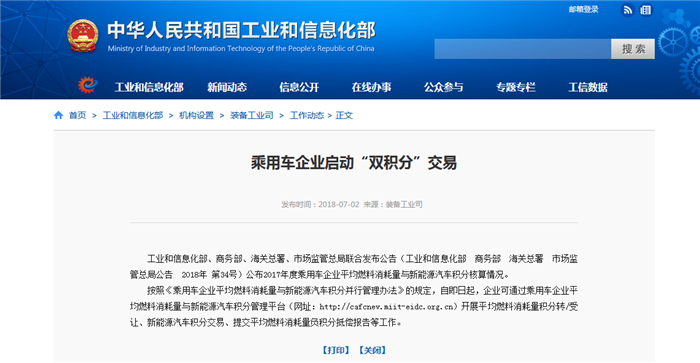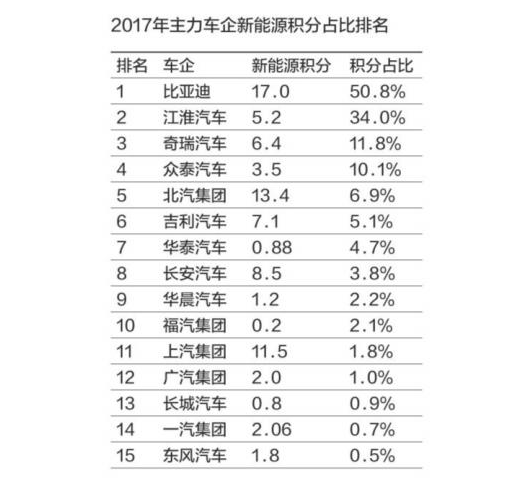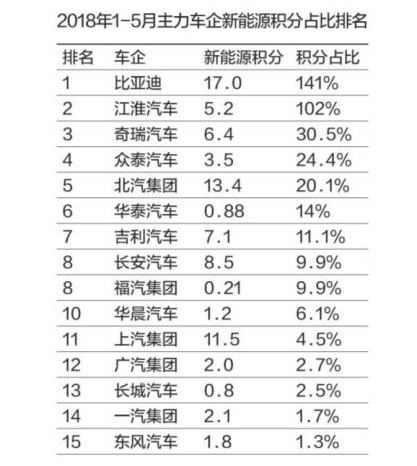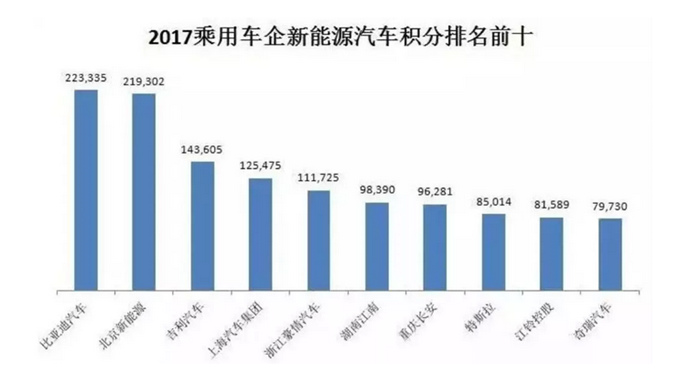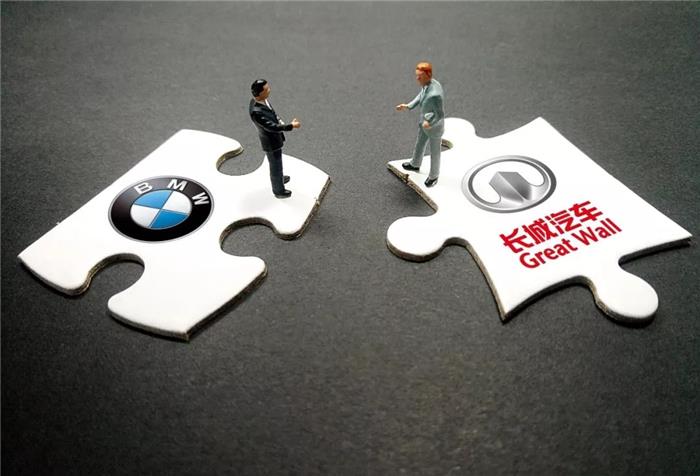With the implementation of the "Double Integration Method" and the launch of the trading platform, China's new energy vehicles have entered the post-subsidy era. In the game of double-points policy, the major car companies can be described as a few happy ones. As early as September 2017, the Ministry of Industry and Information Technology clearly stated that passenger car companies will evaluate the points based on the average fuel consumption of passenger cars and the “double points†system for the proportion of new energy vehicles. If the points do not meet the standard and fail to pay the negative points, the car companies will face penalties such as suspension of declaration of the car catalogue and suspension of production or import of some traditional car models. According to the policy, the proportion of new energy points in 2018, 2019 and 2020 is 8%, 10% and 12% respectively. In short, the new energy vehicle integral is the difference between the actual value of the new energy vehicle integral and the standard value of the enterprise in that year. After the official implementation of the "Double Points Method" on April 1 this year, new energy vehicles once again ushered in explosive growth, and their own brands became the big winners of new energy vehicle points. According to statistics from the Federation, the number of new energy vehicles produced in the country from January to May was 270,000 units, an increase of 129% compared with 2017; the number of new energy points was 820,000, a year-on-year increase of 64%; an average of 3.1 points per passenger car Compared with 2.9 points in 17 years, it increased by 7%; the proportion of points in the first five months of domestic independent brands reached 21.5%, while the joint venture brand was only 0.7%. In the first five months of 2018, the proportion of new energy vehicles reached 8.9%, exceeding the 6.8% for the full year of 2017, exceeding the 8% compliance requirement. According to the "Double Integration Method", before June 30, the Ministry of Industry and Information Technology will issue a double-point accounting report. If a passenger vehicle enterprise has an average fuel consumption negative integral and a new energy vehicle negative integral, it shall submit it to the Ministry of Industry and Information Technology within 60 days after the release of the average fuel consumption of the passenger vehicle enterprise and the new energy vehicle point accounting report. The average fuel consumption negative integral and the new energy vehicle negative integral compensation report, and the negative integral compensation zero return within 90 days after the release of the accounting report. That is, the first concentrated transaction of the points will be ushered in the third quarter of this year. The Equipment Industry Department of the Ministry of Industry and Information Technology announced on July 2 that the average fuel consumption of passenger car companies and the new energy vehicle points management platform have been launched. From now on, passenger car companies can carry out fuel consumption points on this platform. Transfer, new energy vehicle points trading. Under the game of double points, the most joyful ones are BYD and BAIC. The point transaction started, and BYD and BAIC can get 1 billion yuan of income with sufficient points in their hands. Looking at the top few car companies, it is not so optimistic, Changan Automobile, Great Wall Motor may have to spend 1 billion for this cost. Those companies with small sales volume, weak profitability, and no big background and joint venture partners may face serious survival problems. However, as one of the important drafters of the double-point policy, Zhao Dongyu, deputy chief engineer of the Data Resource Center of China Automotive Technology Center, said that from the perspective of the entire industry, now both the positive score of CAFE (average fuel consumption) and the new energy Positive points are relatively abundant. At present, there are several companies with CAFE negative points in the industry. Nearly 2 million points are concentrated in the top ten enterprises. The point of the point transaction is very small, which is between 20 companies. In addition, if the point transaction price can reach 1000 yuan / min, it will reach the previous expectations, but the current feedback in the industry may be less optimistic than we expected, the total amount of positive points in the two years will be more . After the official point trading in July, the activity level of the transaction can be judged. The volume of the transaction and the trading company may not be as optimistic as we expected, and the pressure may be released in September. In the post-subsidy era, in the face of the arrival of double points, the major car companies will certainly not sit still. The re-joint venture between brands is also the result of bold trials by major auto companies to cater to the market and continue to play. Hand in hand, although "you love me", but it is "feeling must have". For example, the marriage of Jianghuai Volkswagen. Jianghuai's sales and profits have been declining in recent years, but the new energy business is unique because of its first-mover advantage. According to the data, in 2017, Jianghuai Automobile produced 497,979 new vehicles and 510,892 new vehicles, down 24.13% and 20.58% respectively. The net profit attributable to shareholders of listed companies also decreased by 62.83% year-on-year; The increase of 3.8 % to 28,263 vehicles became the only bright spot. From January to May this year, Jianghuai sold a total of 223,700 vehicles, down 6.68% year-on-year, while the cumulative sales of pure electric passenger vehicles increased by 184% to 18,000 compared with the same period last year. Volkswagen, in 2016, sales of cars in China reached 3.98 million units, and it is expected to exceed 4 million units in 2018. Based on 8% of new energy points, it requires at least 320,000 points, while Volkswagen's pure electric models are electric up. They are all imported models, they are not eligible for financial subsidies, the prices are high, and sales are naturally rampant. Under such circumstances, it is reasonable for the German Volkswagen to marry the Jianghuai Automobile, which is superior to the new energy vehicle. In mid-June 2017, German Volkswagen and Jianghuai Automobile signed an investment agreement. The newly established joint venture company will officially launch the first electric vehicle in 2018. In 2020, it will realize 200,000 production and sales, which almost opened the same foreign-owned automobile enterprise. A precedent for the establishment of three joint ventures in China. However, considering the cycle from construction to production, the new joint venture of Volkswagen Jianghuai will not be able to help the Volkswagen Group's 2018 points. However, in the long run, after the marriage, the group will warm up and benefit each other. In the fierce market competition environment, it will be beneficial to the survival and development of both parties. So far, the number of joint ventures established by the "double-point system" has reached five, in addition to the Jianghuai Volkswagen, there are Great Wall BMW, Zhongtai Ford, Beiqi Daimler, Dongfeng Renault-Nissan. The opportunity for policy has made it possible to brand a brand that seems impossible to cooperate. Open Cell Natural Rubber sheet Rubber foam Our G5 series natural rubber foam is made out of natural rubber harvested from rubber trees, plant-based and latex-allergy friendly natural rubber rather than the traditional petroleum-based and limestone-based neoprene. Compared to the traditional neoprene sheets, the natural rubber wetusits production process saves up to 80% on CO2 emissions in one wetsuit. And our all G5 rubber plantations are 100% FSC® certified. FSC® certified means that buying your new G5 natural rubber wetsuit does not contribute to deforestation, human right violations or abuse of agricultural pesticides. It also means that the hevea rubber – the main ingredient G5 natural rubber foam is only extracted from plantations that preserve ecological integrity and biodiversity. Though only 4% of global rubber plantation area is currently FSC®-certified, well-managed FSC®-certified forest management has the potential to affect a positive environmental and social transformation of the natural rubber sector. foamed natural rubber,natural gum rubber Dongguan JinYe Sports Apparatus Co., Ltd , https://www.yuwos.com